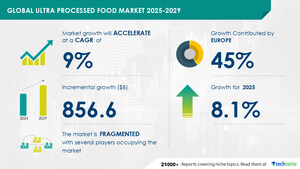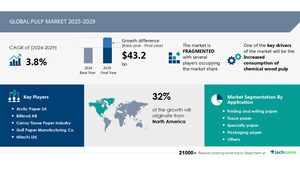NEW YORK, Jan. 27, 2025 /PRNewswire/ -- Report on how AI is redefining market landscape - The global data center market size is estimated to grow by USD 535.6 billion from 2025-2029, according to Technavio. The market is estimated to grow at a CAGR of 15.6% during the forecast period. Rise in adoption of multi-cloud and network upgrades is driving market growth, with a trend towards implementation of AI in data centers. However, cybersecurity issues poses a challenge. Key market players include 365 Data Centers, Amazon.com Inc., Apple Inc., China Telecom Corp. Ltd., Cisco Systems Inc., CyrusOne LLC, Cyxtera Technologies Inc., Digital Realty Trust Inc., Equinix Inc., Google LLC, Hewlett Packard Enterprise Co., Intel Corp., International Business Machines Corp., KDDI Corp., Microsoft Corp., Nippon Telegraph and Telephone Corp., Oracle Corp., Salesforce Inc., SAP SE, and Verizon Communications Inc..
Key insights into market evolution with AI-powered analysis. Explore trends, segmentation, and growth drivers- View Free Sample PDF
Data Center Market Scope |
|
Report Coverage |
Details |
Base year |
2024 |
Historic period |
2019 - 2023 |
Forecast period |
2025-2029 |
Growth momentum & CAGR |
Accelerate at a CAGR of 15.6% |
Market growth 2025-2029 |
USD 535.6 billion |
Market structure |
Fragmented |
YoY growth 2022-2023 (%) |
13.2 |
Regional analysis |
North America, APAC, Europe, South America, and Middle East and Africa |
Performing market contribution |
North America at 35% |
Key countries |
US, China, UK, Canada, Japan, Germany, India, France, Italy, and Brazil |
Key companies profiled |
365 Data Centers, Amazon.com Inc., Apple Inc., China Telecom Corp. Ltd., Cisco Systems Inc., CyrusOne LLC, Cyxtera Technologies Inc., Digital Realty Trust Inc., Equinix Inc., Google LLC, Hewlett Packard Enterprise Co., Intel Corp., International Business Machines Corp., KDDI Corp., Microsoft Corp., Nippon Telegraph and Telephone Corp., Oracle Corp., Salesforce Inc., SAP SE, and Verizon Communications Inc. |
Data Centers are at the heart of the digital economy, powering businesses, individuals, and the Internet. Trends like Artificial Intelligence, Machine Learning, IoT, and Cloud Computing are driving the need for advanced IT infrastructure. The Department of Energy pushes for Green Data Centers, while Enterprise Engineering Solutions and Software Testing Help ensure optimal performance. Customers demand cost savings, scalability, and flexibility for real-time data processing. Macroeconomic factors, digitalization, and business leaders are embracing Cloud Technology to store and analyze data for applications like autonomous vehicles, smart cities, and e-commerce. Decentralized Data Centers address local special circumstances and data sovereignty regulations. B2B enterprises focus on hardware-related expenses, while National Statistical Offices track the level of digitization. The exponential trend smoothes the S-curve function of data center systems, balancing exchange rates and competition in the market. Data security, backups, and Internet bandwidth are crucial concerns for end-users. Managed hosting, colocation, and big data analytics are essential services for businesses, with public cloud, specialized regions, and hyper-scale platforms leading the way. IoT, mobile data use, and internet usage continue to increase, driving the need for cloud data storage and data center workloads.
Data centers are enhancing energy efficiency through the application of Artificial Intelligence (AI). AI technology enables faster decision-making and optimization of server, power, and cooling systems. Data center service providers use AI in automation software to streamline operations, minimize human intervention, and promote energy-efficient cooling. Supervised control over mechanical cooling is facilitated by AI, allowing for effective power usage and improved performance. By implementing AI, data centers aim to reduce downtime, minimize errors, and boost overall efficiency.
Request Sample of our comprehensive report now to stay ahead in the AI-driven market evolution!
• Data Centers face numerous challenges in today's digital world. Artificial Intelligence and Machine Learning require massive computing power, driving the need for advanced IT infrastructure. The Internet of Things (IoT) and Cloud Computing increase data volumes, demanding scalability and flexibility. Green Data Centers address energy efficiency concerns, while Department of Energy grants aid in research. Enterprise Engineering Solutions and Software Testing Help ensure system reliability. Customers seek cost savings, real-time data processing, and local special circumstances considerations. Digitalization and businesses' growing reliance on data necessitate decentralized Data Centers. Data sovereignty regulations and macroeconomic factors impact the digital economy and internet penetration. B2B enterprises grapple with hardware-related expenses and data center workloads. National statistical offices require high levels of digitization for accurate data analysis. Exponential trend smoothing and S-curve functions help predict growth. Exchange rates and business leaders' decisions influence cloud technology adoption. Data security, backups, and internet bandwidth are crucial concerns. Managed hosting, colocation, and public cloud offerings cater to various needs. Hyper scale platforms and colocation data centers like Amazon Web Services address big data and IoT demands. Autonomous vehicles, smart cities, and mobile data use further increase the importance of Data Centers. Challenges include application performance, storage requirements, and data security. Online retail and e-commerce rely on data center systems for personalized data storing and analyzing. Data center systems must ensure speed, reliability, and data security to meet end-users' expectations. In conclusion, Data Centers face a myriad of challenges, from technological advancements to regulatory requirements and customer expectations. Adapting to these challenges is crucial for businesses and individuals to thrive in the digital age.
• Enterprises rely heavily on data for generating revenue and making informed business decisions. However, the security of this valuable asset is a significant concern. With the increasing adoption of cloud services and IoT solutions, the risk of cyberattacks is escalating. Cybercriminals can exploit IT security vulnerabilities to gain unauthorized access to enterprise servers, potentially compromising sensitive data such as customer information. Such attacks can lead to financial losses and even the closure of small businesses. It's crucial for enterprises to prioritize IT security to protect their data and maintain business continuity.
Discover how AI is revolutionizing market trends- Get your access now!
This data center market report extensively covers market segmentation by
- Component
- 1.1 IT infrastructure
- 1.2 Power management
- 1.3 Mechanical construction
- 1.4 General construction
- 1.5 Security solutions
- End-user
- 2.1 BFSI
- 2.2 Energy
- 2.3 IT
- 2.4 Others
- Geography
- 3.1 North America
- 3.2 APAC
- 3.3 Europe
- 3.4 South America
- 3.5 Middle East and Africa
1.1 IT infrastructure- The data center IT infrastructure market consists of server infrastructure, storage infrastructure, software-defined data centers (SDDC), network infrastructure, converged infrastructure, backup and recovery software, automation software, and data center infrastructure management (DCIM) solutions. Enterprises and data center service providers are shifting their investments from capital expenditure (CAPEX) to operational expenditure (OPEX) models to optimize server infrastructure usage and reduce costs. This trend is driving the demand for consolidation, virtualization, and containerization of computing needs. The server infrastructure segment includes rack servers, blade servers, tower servers, microservers, and Open Compute Project (OCP) servers. Rack servers are the most widely used data center servers due to their suitability for enterprises with fixed business requirements. The storage infrastructure segment includes direct-attached storage (DAS), network-attached storage (NAS), and storage area network (SAN). The exponential growth in data generated and transferred necessitates the demand for data storage infrastructure. The adoption of software-defined data centers (SDDCs) is increasing due to their cost savings, improved efficiency, control, and flexibility. SDDCs consist of software-defined computing (SDC), software-defined network (SDN), and software-defined storage (SDS). Network infrastructure includes devices such as Ethernet switches, routers, application delivery controllers (ADCs), Web optimizers (WOPTs), and SD-WAN appliances. Converged infrastructure is a data center management technique that combines multiple IT components into a single integrated computing package. Data center automation software enables the workflow management of a data center and automates servers, networks, storage, and other data center management tasks. Data center backup and recovery software ensures business continuity by enabling periodic backup and instantaneous recovery of data. DCIM solutions facilitate the administration of a data center with an overall integrated view for asset and capacity management, energy management, power and cooling, and network management. The increasing investments in data centers and the focus on improving operational efficiency are driving the growth of the global data center market.
Download a Sample of our comprehensive report today to discover how AI-driven innovations are reshaping competitive dynamics
The Data Center market is experiencing significant growth due to the increasing demand for IT infrastructure to support Artificial Intelligence (AI) and Machine Learning (ML) applications, the Internet of Things (IoT), and the digitalization of businesses and individual lives. Cloud computing and edge computing are driving this trend, allowing for cost savings, scalability, and flexibility. Real-time data processing is essential for online retail and e-commerce businesses, making data centers a crucial component of their operations. Data center systems enable businesses to store, analyze, and manage their data center workloads efficiently. The loss of data can result in significant financial and reputational damage, making data center security a top priority. Cloud technology is revolutionizing the data center landscape, providing faster access to personalized data for businesses and individuals alike.
The Data Center market is experiencing significant growth due to the increasing adoption of Artificial Intelligence (AI) and Machine Learning (ML) technologies, IoT devices, and Cloud computing. Green Data Centers are becoming increasingly popular as businesses and individuals prioritize cost savings, scalability, and flexibility. The Digitalization of industries and economies is driving the demand for real-time data processing and reducing latency. Decentralized Data Centers are gaining traction in response to local special circumstances, data sovereignty regulations, and macroeconomic factors. The market is also influenced by the level of digitization, business leaders' decisions, and competition in cloud technology. Hardware-related expenses, data security, and backups are key concerns for end-users. The market includes various data center systems, such as managed hosting, colocation, and public cloud, catering to the needs of B2B enterprises, online retail, e-commerce, and intelligent buildings. Big data and data analytics are essential for application performance and storage requirements. Mobile data use and internet usage continue to increase, leading to a growing demand for cloud data storage. The market is expected to follow an S-curve function with exponential trend smoothing, influenced by exchange rates and the growth of hyper-scale platforms.
1 Executive Summary
2 Market Landscape
3 Market Sizing
4 Historic Market Size
5 Five Forces Analysis
6 Market Segmentation
- Component
- IT Infrastructure
- Power Management
- Mechanical Construction
- General Construction
- Security Solutions
- End-user
- BFSI
- Energy
- IT
- Others
- Geography
- North America
- APAC
- Europe
- South America
- Middle East And Africa
7 Customer Landscape
8 Geographic Landscape
9 Drivers, Challenges, and Trends
10 Company Landscape
11 Company Analysis
12 Appendix
Technavio is a leading global technology research and advisory company. Their research and analysis focuses on emerging market trends and provides actionable insights to help businesses identify market opportunities and develop effective strategies to optimize their market positions.
With over 500 specialized analysts, Technavio's report library consists of more than 17,000 reports and counting, covering 800 technologies, spanning across 50 countries. Their client base consists of enterprises of all sizes, including more than 100 Fortune 500 companies. This growing client base relies on Technavio's comprehensive coverage, extensive research, and actionable market insights to identify opportunities in existing and potential markets and assess their competitive positions within changing market scenarios.
Technavio Research
Jesse Maida
Media & Marketing Executive
US: +1 844 364 1100
UK: +44 203 893 3200
Email: [email protected]
Website: www.technavio.com/
SOURCE Technavio

WANT YOUR COMPANY'S NEWS FEATURED ON PRNEWSWIRE.COM?
Newsrooms &
Influencers
Digital Media
Outlets
Journalists
Opted In





Share this article